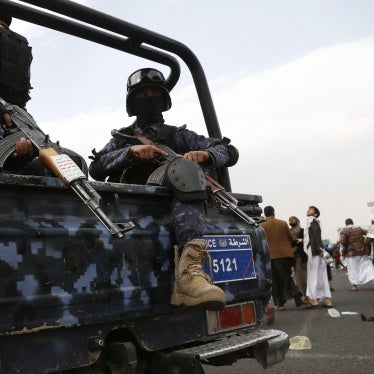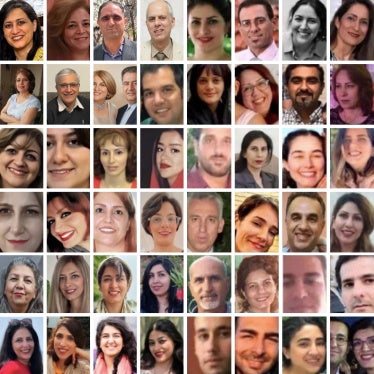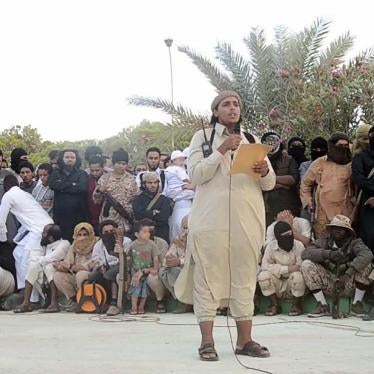Urgent Update, June 13, 2014: Prison officials have reportedly informed 4 of the 33 Rajae Shahr prisoners on death row—Hamed Ahmadi, Jahangir Dehghani, Jamshid Dehghani, and Kamal Mollaie—that they are to appear in court on June 14, raising grave concerns that this step will result in their executions. The men were convicted of the murder of a senior Sunni cleric with ties to the Iranian authorities. They deny the accusation, saying that they have been in custody since they were arrested between June and July 2009, several months before the sheikh’s killing in September 2009. Human Rights Watch has documented previous cases in which prison authorities have summoned prisoners under false pretenses, such as to appear in court or meet with family members, only to proceed to carry out their execution.
The Iranian authorities should quash the death sentences of 33 Sunni Muslim men, including possibly a juvenile offender, convicted of “enmity against God” (moharebeh), and impose an immediate moratorium on all executions, 18 human rights organizations and one prominent human rights lawyer said today. The call comes amid serious concerns about the fairness of the legal proceedings that led to the men’s convictions and the high number of executions reported in Iran during the last year, including the June 1, 2014 hanging of a political dissident, Gholamreza Khosravi Savadjani, on the same charge.
Information the rights groups gathered suggests that most of the men were arrested by Intelligence Ministry officials in the western province of Kordestan in 2009 and 2010, and held in solitary confinement during their pretrial detention for several months without access to a lawyer or relatives. They are believed to have been tortured or otherwise ill-treated during that time.
Thirty one of them were tried by Branch 28 of the Revolutionary Court of Tehran, while one was tried by Branch 15 of the Revolutionary Court of Tehran and another by a branch of the Revolutionary Court of Sanandaj. They were sentenced to death after being convicted of vaguely worded national security offenses including “gathering and colluding against national security,” “spreading propaganda against the system,” “membership in Salafist groups," “corruption on earth,” and “enmity against God.” The latter two charges can carry the death penalty.
These vaguely worded offenses in Iran's Islamic Penal Code do not meet the requirements for clarity and precision that international law outlines for criminal law. The authorities, routinely invoke them to arrest and imprison people who have peacefully exercised their rights to freedom of religion, expression, association, and assembly, or to accuse activists of supporting violent or armed opposition groups without evidence, the rights groups said.
Information gathered by the rights groups suggests that all of the men deny any involvement in armed or violent activities and maintain that they were targeted solely because they practiced or promoted their faith, such as taking part in religious seminars and distributing religious reading materials. Sunni Muslims are a minority in Iran, where most Muslims follow the Shia branch of Islam. Most Iranian Sunnis are from the Kurdish and Baluch minorities, and have long complained of state discrimination against them in both law and practice.
Recent changes to Iran’s penal code require the judiciary to review the cases of the 33 men, and vacate their death sentences on the charge of “enmity against God” if they had not personally resorted to the use of arms. The execution of Gholamreza Khosravi Savadjani, despite no evidence being presented to the court that he had used arms, suggests that Iranian authorities appear not to implement new provisions of the penal code that could save the lives of these 33 men, and others on death row on the charge of “enmity against God.”
According to his national identity card, at least one of the defendants, Borzan Nasrollahzadeh, is believed to have been under 18 at the time of his alleged offense, which would prohibit his execution under international law, including under the Convention on the Rights of the Child, to which Iran is a party.
Among the group are four men -- Hamed Ahmadi, Jahangir Dehghani, Jamshid Dehghani and Kamal Molaee -- accused of killing Mullah Mohammad Sheikh al-Islam, a senior Sunni cleric with ties to the Iranian authorities. The men have denied the accusation, saying that they were arrested between June and July 2009, several months before the sheikh’s killing, in September. The Supreme Court upheld the death sentences in September 2013, and the sentences have been sent to the Office for the Implementation of Sentences, the official body in charge of carrying out executions. The men are considered to be at imminent risk of execution.
The Supreme Court also confirmed the death sentences of four other members of the group -- Seyed Jamal Mousavi, Abdorahman Sangani, Sedigh Mohammadi and Seyed Hadi Hosseini, the rights groups reported. The other 25 men remain on death row pending review by the Supreme Court. Most of them are believed to be held in the Raja’i Shahr and Ghezel Hesar prisons in the city of Karaj. One, Seyed Jamal Mousavi, is reportedly in Sanandaj Prison in Kordestan province.
The rights groups are concerned that authorities sentenced the 33 men to death after trials during which basic safeguards, such as rights of defense, were disregarded, in contravention of international fair trial standards. Information gathered by the groups indicates that at least some of the men were denied access to a lawyer of their own choosing before and during their trials, in breach of Article 35 of the Iranian Constitution, which guarantees the right to counsel.
Their court-appointed lawyers were not allowed to see them in prison and did not have access to their files, according to information gathered by the groups. A few of the men have alleged that they met their lawyers for the first time a few minutes before the start of their trials. The court proceedings were held behind closed doors and reportedly lasted only between 10 to 30 minutes.
Some of the men also alleged that the judiciary handed down their death sentences based on incriminating statements they were forced to sign under torture and other ill-treatment, in violation of Article 38 of the Iranian Constitution, which prohibits all forms of torture “for the purpose of obtaining confessions.” Several alleged in open letters that they were physically and psychologically abused during their detention. One of the men, Shahram Ahmadi, wrote:
“Officers of the Revolutionary Guards kicked me in the head and face, causing my nose and head to break…I did not receive any treatment for my broken nose…and I currently have breathing difficulties as a result… [My] interrogator knew that I had been injured [in a previous incident of mistreatment]. He purposely punched me in my stomach and I began bleeding heavily from my old wounds. I was hospitalized in Sanandaj Hospital under a fake name... later my wounds became infected but they refused to give me medication.”
The rights groups have found no information indicating that there was any investigation into these allegations of torture and other ill-treatment, contrary to Iran’s domestic law and international law. Article 578 of Iran’s Islamic Penal Code provides for the punishment of officials who torture people to obtain confessions. Article 7 of the International Covenant on Civil and Political Rights (ICCPR), to which Iran is a party, prohibits the use of torture and other ill-treatment.
The irregularities reported in the men’s trials would also violate the fair trial provisions of Article 14 of the ICCPR, which include the presumption of innocence, adequate time and facilities to prepare one’s defense and to communicate with a lawyer of one’s choosing, and not to be compelled to testify against oneself or to confess guilt. The UN Human Rights Committee has stated that: “In cases of trials leading to the imposition of the death penalty scrupulous respect of the guarantees of fair trial is particularly important.”
In view of the apparently flawed legal proceedings, these 18 human rights groups and one prominent human rights lawyer urge the Iranian authorities to immediately halt the execution of these men and quash their sentences. Authorities should, at the very least, grant these men retrials in proceedings that comply with international standards of fair trial, without recourse to the death penalty.
The 33 men are, in an alphabetical order: Hamed Ahmadi, Shahram Ahmadi, Alam Barmashti, Jahangir Dehghani, Jamshid Dehghani, Seyed Shaho Ebrahimi, Varia Ghaderifard, Mohammad Gharibi, Seyed Abdol Hadi Hosseini, Farzad Honarjo, Mohammad Keyvan Karimi, Taleb Maleki, Kamal Molaee, Pouria Mohammadi, Keyvan Momenifard, Sedigh Mohammadi, Seyed Jamal Mousavi, Teymour Naderizadeh, Farshid Naseri, Ahmad Nasiri, Borzan Nasrollahzadeh, Idris Nemati, Omid Peyvand, Bahman Rahimi, Mokhtar Rahimi, Mohammadyavar Rahimi, Abdorahman Sangani, Amjad Salehi, Behrouz Shahnazari, Arash Sharifi, Kaveh Sharifi, Farzad Shahnazari, and Kaveh Veysi.
Iran remains the second largest executioner in the world, after China. In 2013, according to Amnesty International figures, the Iranian authorities officially acknowledged 369 executions. However, reliable sources have reported that hundreds of additional executions took place in 2013, bringing the total to over 700. According to Amnesty International, as of May 25, 151 executions during 2014 have been acknowledged by the authorities or state-sanctioned media, while reliable sources have reported at least 180 additional executions, for a total of 331.
The rights groups are:
Amnesty International
Human Rights Watch
Justice for Iran
Abdorrahman Boroumand Foundation
Arseh Sevom
Association for Defense of Azerbaijani Political Prisoners in Iran
Association for Human Rights in Kurdistan of Iran-Geneva (KMMK-G)
Baloch Human Rights Organization
Center for Combating Racism & Discrimination against Arabs in Iran
Centre for Supporters of Human Rights
Ensemble contre la peine de mort (ECPM)
International Campaign for Human Rights in Iran
Iran Human Rights
Iran Human Rights Documentation Center
Step by Step to Stop Death Penalty (LEGAM)
Mehrangiz Kar
Nobel Women’s Initiative
Siamak Pourzand Foundation
United for Iran








